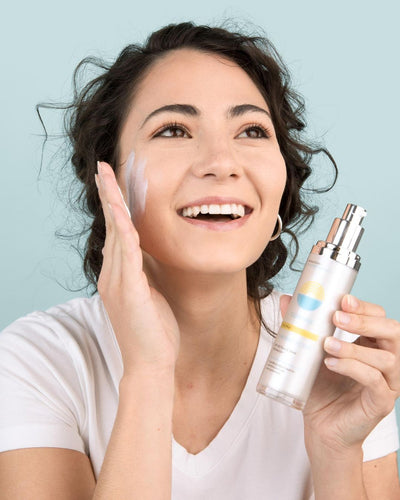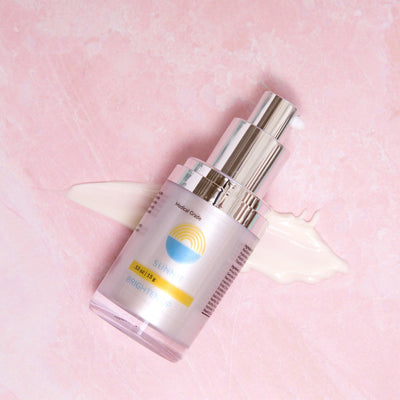Skin aging begins at birth and continues throughout life due to the cumulative effects of normal cell division and of, sun exposure, and other environmental factors. As we age, our face loses elasticity, resulting in wrinkles and sagging. It loses its firmness, making it more susceptible to other issues such as acne and cellulite.
Overview
As we age, our skin loses much of its elasticity and suppleness. Wrinkles form, as do sagging jowls and bags under our eyes. Skin aging results from several complex factors, including inflammation, sun exposure, and the natural deterioration of the body's tissues over time.
Other factors such as smoking, stress, excessive alcohol consumption, and poor nutrition accelerate the skin aging process. In specific cases, genetics play an essential role in determining how quickly your skin ages. Skin products can help us look younger by plumping fine lines, fading discoloration, and minimizing large pores.
While aging skin is a natural part of life, there are some things you can do to keep your skin looking healthy. The sooner you start looking after your skin in youth, the easier it will be to maintain throughout later life. Here are a few tips on how to protect your skin from premature aging while also increasing its elasticity, so you have healthier-looking skin now and in the future.
What is aging skin?
Aging skin includes wrinkles, loss of elasticity, and age spots. Aging skin is also associated with phenotypic changes in melanocytes and hair follicles. Our collagen fibers break down as we age, leaving us with less supple, elastic skin.
Instead of an active springing back of elastin and collagen, we end up with a rigid network that is more susceptible to visible signs of aging. The condition, called elastosis, is characterized by fine cracks or crevices in your facial and neck skin.
Why treat aging skin?
We reverse aging skin because it makes a statement about how we feel about ourselves. No one likes feeling old and tired of seeing every wrinkle in a harsh overhead light. Thanks to advanced treatments for your aging skin, you don't have to settle for that fate.
What are some common skin conditions that can occur with aging?
Knowing the most common skin diseases that occur with the aging process can help you identify problems in their early stages, making them easier to treat and might keep them from worsening over time. These conditions include:
Skin cancer
As we age, our skin is more susceptible to cancer. That's because as we get older, our immune system and cells don't fight off damage as well. Watch for any new moles or marks that appear. Another sign of skin cancer is a new spot on your neck or shoulders. Look for changes like thickening, texture, or color changes of moles and spots on your body.
Eczema
Eczema is long-term inflammation of your skin, specifically on your hands, feet, and joints. It's an umbrella term for several chronic conditions atopic dermatitis, nummular eczema, and seborrheic dermatitis. They all have varying degrees of irritation, itching, swelling, and redness.
Psoriasis
Psoriasis is a genetic disorder in which your immune system attacks healthy cells. There is no cure for psoriasis but ways to manage it and control symptoms. Severe psoriasis may need treatment from a dermatologist, who will examine your skin and prescribe a treatment regimen as well as possible prevention techniques.
A healthy diet and plenty of sleep might also improve your symptoms. You might need to take oral medications or receive UV light treatments such as phototherapy, depending on your case.
What causes the skin to age?
The UV rays from sunlight can destroy collagen and elastin, essential for healthy skin. Dry aging skin is more susceptible to sun damage, which leads to fine wrinkles and other skin conditions.
That's why wrinkles, age spots, and discoloration become more prevalent as you get older. Avoid excessive sun exposure by using strong sunscreen every day to keep your skin looking healthy as you age.
Another common cause of skin aging is inadequate or improper skin care. You may not realize it, but everyday habits like harsh cleansers can cause your skin to age prematurely. It's best if you start on a basic regimen early, so you don't have to worry about fine wrinkles as much.
When shopping for skincare products, make sure they are appropriate for sensitive skin. No matter how careful you are with other factors, it won't be enough if your products aggravate existing conditions or leave excess oil and residue on your face after use.
What does aging skin look like?
Understanding what aging skin looks like will help you take better care of your skin now and in the future. Here are some of the most common signs of aging skin to look out for as you get older and tips to help prevent or slow down the skin aging timeline.
Wrinkles
Folds and wrinkles become more visible as your skin becomes thinner. While everyone ages differently, it's common for vertical lines to appear on your forehead, near your eyes, around your mouth, and between your eyebrows.
Age spots
Age spots are flat brown spots that occur on sun-exposed areas of skin. The darker your skin is and the longer you spend in direct sunlight, the more likely you will develop these minor blemishes. Unfortunately, there's no way to prevent them entirely.
Skin tags
A skin tag is a benign growth that develops from a tiny stalk of tissue on your skin. Skin tags can have a smooth or irregular appearance on their surface. They typically resemble a person's skin but can be slightly brown.
Dry skin & Discoloration
Aged skin looks dry and discolored. You'll notice that some parts of your face have more wrinkles than others if you look closely. This uneven texture is typically most prominent on our cheeks and forehead.
You lose volume in the face due to loss of collagen from sun damage, so less fat tissue appears under our skin. Since you don't produce melanin as quickly as you did when younger, your hands, feet, and lips may develop spots or patches of lighter pigmentation.
How can I stop my skin from aging?
Many different factors affect your skin as you age, and it's impossible to eliminate them all in one go. Fortunately, there are several things you can do to slow down the effects of aging on your skin and prevent premature aging from occurring altogether.
Eat Right
A healthy diet can help you strengthen the immune system and make your body more nutritious overall. Your diet should include many fruits and vegetables containing antioxidants that protect the skin from free radicals. Fruits and veggies also provide the necessary nutrients to keep your skin glowing. Smoking can worsen skin irritation and dryness. It is best to quit smoking altogether as this can help protect sensitive skin from further damage.
Protect the Skin From the Sun
It is crucial to protect sensitive skin against ultraviolet rays when going out. Wear sunscreen that protects you against the harsh rays of the sun. It will prevent sunburns or damage that can cause dark spots on the face.
Exercise Regularly
When it comes to a healthy lifestyle, regular exercise is the key. Exercise improves blood circulation that will help bring nutrients to your skin and remove toxins from within. It can also speed up your body's metabolism, so you properly get rid of dead skin cells.
Aging Skin Care
It is essential to clean your face several times a day, twice a day, with warm water and a mild cleanser. Washing helps remove all dirt and excess oil that clog the pores. If you wear makeup, it's best to use makeup remover wipes before you cleanse so that your skin is spotless.
Be careful about what you apply to your skin. Limit products and choose those that suit your sensitive skin type. Avoid using harsh chemicals, and be sure to pick a milder cleanser, toner, moisturizer for daily use.
Always perform a skin test before using any skincare product. Apply a small amount in an inconspicuous area and wait for at least 24 hours to check if it causes irritation or not.
Aging Skin Treatment Options
There are plenty of treatment options that help rejuvenate the look of aging skin and restore it to a more youthful state.
Fillers
A filler is a medical-grade product injected into your skin to plump it up Most fillers utilize hylauronic acid, a building block of collagen. Done correctly, it adds volume and helps hide wrinkles for a smoother and more youthful look.
Fillers come in many different textures and strengths. Dermal fillers utilize ingredients such as:
- Polymethyl
- Polylactic acid
- Calcium hydroxylapatite
Laser Treatment
Laser skin resurfacing is one of many treatments that you may use to treat aging skin. This treatment improves your skin's texture, appearance, and function due to photoaging.
It works by removing the damaged, thin outer layer of the skin via a laser beam. The damage leaves smooth new-looking skin in its place as the epidermis heals.
Botox
Doctors have used Botox for years to treat medical conditions that cause facial muscle spasms, such as severe cases of migraine and blepharospasm (eyelid spasms).
Today, doctors use it to help reduce the appearance of wrinkles and fine lines on the face by temporarily paralyzing specific muscles. Botox prevents nerve signals from being sent to the muscles. This helps soften and diminish wrinkles.
The best anti-aging ingredients
Preventing the signs of aging before they become visible on your skin is an essential part of anti-aging skincare. Skincare products with these ingredients tend to offer the best benefits.
Retinol
Beta carotene is responsible for creating vitamin A in your body. High levels of beta carotene are converted into retinol as you age. The only downside of retinol is that it can be irritating when used on sensitive skin types.
Hydroxy acids
While they aren't technically antioxidants, hydroxy acids can reduce inflammation by breaking down damaged skin cells. For best results in skincare, use a vitamin C serum or powder.
Vitamin C
Vitamin C brightens, tightens, and firms up your skin. Vitamin C reduces fine lines and wrinkles, giving your skin a firmer and smoother appearance. Vitamin C also helps boost collagen production.
The best products for aging skin
These products also work well to combat the signs of aging by neutralizing free radicals, which are unstable molecules that can damage healthy skin cells.
Chemical peels
Using chemical peels is a great way to refresh your face and even reduce wrinkles over time. The procedure involves applying a chemical solution to your skin, which causes damage to the layer of the skin, revealing smoother skin once the outer layer peels off.
Anti-aging creams
Choose a moisturizer with ingredients proven to boost your body's production of these substances, like niacinamide or peptides. You can also get skin-repairing benefits from antioxidants.
Serums
The potency of serums makes them a great addition to your anti-aging regimen. You can apply a serum to specific areas where you need more hydration, like under your eyes or on your cheeks. And you can use it in place of moisturizer if your skin is dry and sensitive, avoiding harsh chemicals that can irritate mature skin.
How to care for your skin by age?
Clean your face in the morning and evening. Use lukewarm water during cleansing to prevent drying or irritation of the skin. Hot water can only worsen the problem, causing dryness that will lead to flakiness and other reactions on sensitive skin.
Avoid using scented soaps as they may cause irritation, dryness, or redness of the skin. The best way to protect yourself against weather-related sensitivity is to take good care of your skin and avoid sun exposure during peak hours.
The Latest Insights & Analysis About Aging Skin
This study detected similar variation patterns of species diversity and compositional structures based on weighted unique fraction metrics between intrinsic skin aging and photoaging. The study also found potential age-related microbial factors in each group that were likely to affect the integrity of the skin immunity and anti-UV barrier.
Conclusion
Wrinkles, sagging, and loss of elasticity are among some of the characteristics of aging skin. Using moisturizers or serums with retinol can reduce fine lines and repair collagen fibers. For deeper wrinkles, procedures such as fillers are a good option. It's essential to consult a dermatologist before choosing these treatments.




